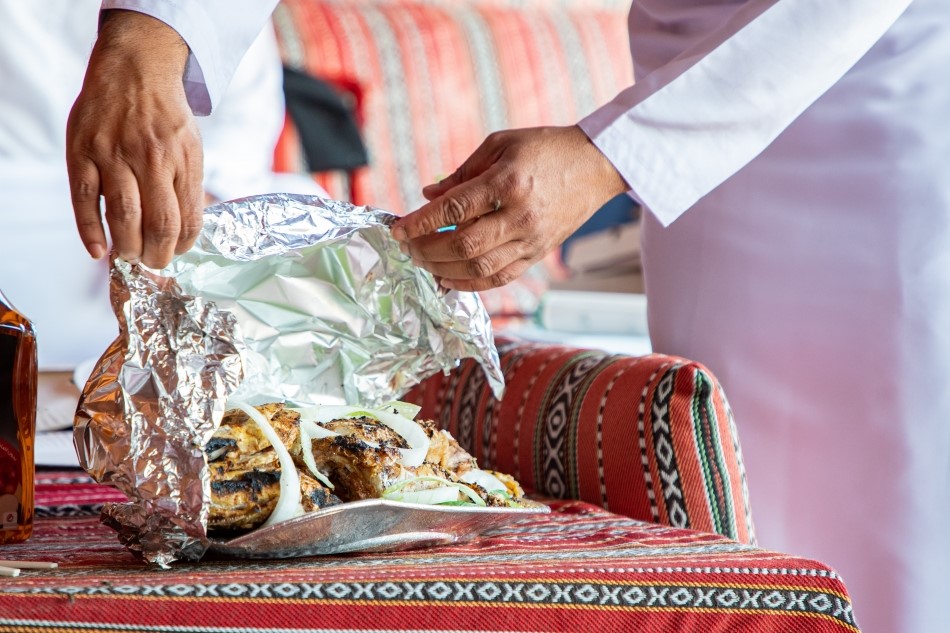In a country made up mostly of desert, the United Arab Emirates are using innovative technologies to sustainably farm fish, decreasing pressure on ecosystems and meeting the needs of a growing population.
It’s hard to imagine a more inhospitable landscape. Beyond the shores of the Gulf in the United Arab Emirates (UAE), parched sand dunes roll across the desert for hundreds of kilometres. It’s no mirage. In fact, three-quarters of the country is covered by desert.
Summer temperatures often soar above 40 degrees Celsius, and freshwater is hard to find. This ancient land recalls centuries of history, but these days the country’s dunes are better known for tourist safaris than their agricultural productivity.
Fishing or farming in such a harsh environment seems ambitious. But FAO has partnered with the UAE in a joint project to develop and expand the country’s fledgling fish farming industry. The aim is to make aquaculture more energy efficient and economically viable to meet the demands of a growing population and their appetite for fish.
“FAO is working with the government to make the UAE a global hub for agricultural technology and innovation,” says Lionel Dabbadie, a Senior Fisheries and Aquaculture Officer at FAO.
“Fish farming is a great example of innovation being successfully applied.”
Consumer appetites have changed
In the Arab Peninsula, Emiratis are among the biggest fish consumers and the orange spotted grouper known as ‘Hamour’ is a local favourite. But as consumer demand has grown, fish stocks have plummeted. The COVID-19 pandemic has also had an impact on consumer expectations and demands for locally produced food. Even though the UAE is a country that needs to import 90 percent of its food requirements, more and more consumers now want to source their food closer to home. So there is enormous potential.
With technical support from FAO, the UAE is investing in modern technologies to build sustainable and profitable aquaculture production that will maintain the country’s fish supply, improve its food security and transform its food system. There has already been incredible progress.
“We are at the beginning; we are working with pioneers,” says Dabbadie, who has had almost 30 years’ experience as a scientist and aquaculture expert in countries as diverse as Brazil, Madagascar, Thailand and the Philippines.


Technicians at Emirate Fish Farm sample fish larvae (left) and produce phytoplankton to feed the fish in the farm (right). Recirculating aquaculture systems conserve precious freshwater and allow for fish farming, even in the desert. ©FAO/FameMedia
Innovation and technology for sustainable aquaculture
FAO estimates that freshwater availability has decreased by two thirds in the Near East and North Africa in the past 40 years, and it is expected to fall by another 50 percent by 2050. However, experts have found ways to use desert salt water, or brackish water, for fish farming.
Innovations such as integrated aquaculture systems, aquaponics or Recirculating Aquaculture Systems (RAS), where water can be recycled or reused, have been developed with a special focus on the unique water scarcity needs of arid countries. Recirculating systems not only conserve precious freshwater, but create ideal conditions for fish, even in harsh desert conditions.
At fish farms like the Emirate Fish Farm at Al Wathba, 40 kilometres from the UAE capital, Abu Dhabi, staff use the latest computer technology to monitor the temperature and quality, as well as oxygen levels, of the water 24 hours a day.
Sensory alerts immediately indicate if there is any variation that could threaten the fish’s survival. Any interruption in the energy supply could be fatal.

Emiratis are among the biggest fish consumers in the Arab Peninsula and the orange spotted grouper known as ‘Hamour’ is a local favourite. ©FAO/FameMedia
Grouper, salmon, seabass and caviar
Aquaculture is a priority for the UAE government, which has listed it as a key component of its National Food Security Strategy. The strategy includes initiatives which promote resilient agricultural practices to increase productivity, while helping to maintain ecosystems. The government is committed to enhancing local production with the use of modern technologies and developing international partnerships to diversify food sources.
A Marine Innovation Park has been established at the Sheikh Khalifa Marine Research Centre in Umm Al Quwain as part of UAE’s plans to advance their bio-science technology innovation and marine science research.
Today, private operators produce 500 -1 000 tonnes of organic Atlantic salmon, grouper, seabass, yellowtail kingfish or caviar at several different facilities throughout the country. Dabbadie says the challenge is to improve the technology and reduce the production costs.
“If they can create economies of scale, they could lift production here to 30 000 tonnes by 2030,” says Dabbadie. “If they can do that, then it will become more profitable.”
The integration of solar energy production – in which UAE is a pioneer – with aquaculture and other innovations, such as selective breeding, also has potential to develop the sector, and this is where FAO is playing an active role.
In a country working to achieve a carbon-neutral society based on renewal energy, these facilities can provide job opportunities for young people and ensure a steady supply of fish for local consumers into the future.
“Technical agriculture requires a high level of technical skill. We need to invest in training the young generation and this is one of the government’s objectives,” says Fatema Al Mulla, Senior Research Analyst at the UAE’s Food and Water Security Office.
FAO is committed to transforming agriculture, forestry and fisheries, with the intention of eliminating hunger, malnutrition and food insecurity as part of attaining the Sustainable Development Goals.
By developing its blue agri-food system, the UAE has the potential to not only meet the needs of its own society but to share its knowledge and expertise with new generations elsewhere










